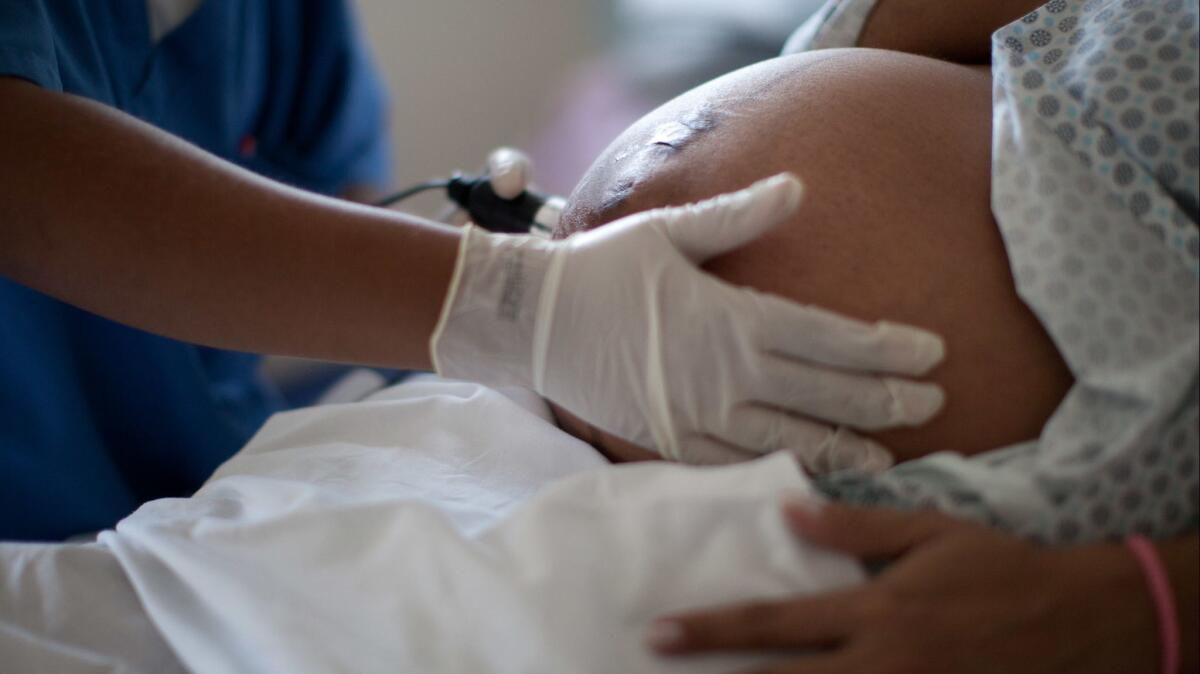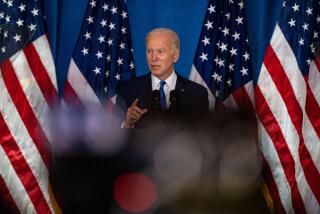When pregnant women who abuse opioids are treated like criminals, their babies suffer

Laws that punish women who abuse drugs during a pregnancy are often billed as a way to protect unborn babies from addiction. But new research finds they have the opposite effect: After states enact laws treating pregnant drug users as unfit mothers or criminals, the number of newborns who contend with drug withdrawal jumps significantly.
The new findings suggest that laws that criminalize a mother’s drug use during pregnancy or threaten to remove newborns from their mothers’ care discourage women from seeking addiction treatment and put their babies at greater risk of health problems from the moment they are born.
The study, conducted by experts at the Santa Monica-based Rand Corp., was published Wednesday in the journal JAMA Network Open. It comes as more states adopt laws against illicit drug users in a bid to reverse a burgeoning epidemic of addiction to opioid painkillers.
“These punitive policies are pushing women into the shadows,” said study leader Dr. Laura Faherty, a pediatrician and health policy researcher. “It’s shaming them from getting prenatal care and treatment for substance use disorder that they need to keep themselves and their babies healthy.”
Faherty said it would be unthinkable to punish women for having epilepsy or diabetes during pregnancy.
“But we treat substance use disorder as a moral failing instead of the medical condition it really is,” she said.
Who is to blame for the nation’s deadly opioid epidemic? That’s the question at the heart of MDL 2804, largest civil action in U.S. history.
Between 1999 and 2013, the number of women in the United States with an opioid use disorder at the time of delivery quadrupled. The consequences for their babies can range from mild to dire: Whether a pregnant woman is taking prescribed opioids for pain, receiving low-doses of opioids as a treatment for addiction or abusing heroin, her newborn is likely to suffer neonatal abstinence syndrome — essentially drug withdrawal — in his or her first days and weeks of life.
While neonatal abstinence syndrome, or NAS, can be managed by pediatric specialists in a hospital, it is often agonizing for a newborn, and very costly. Infants born to mothers who took opioids can require weeks or months of hospitalization, during which the newborn may cry inconsolably and suffer tremors, convulsions and problems with breathing and feeding.
Across the United States, the rate of babies born with NAS rose fourfold from 2000 to 2014. Annual hospital charges for treating these young patients are about $1.5 billion.
It’s not clear that a baby born with NAS will suffer long-term health risks. But the American College of Obstetricians and Gynecologists (ACOG) has noted that chronic untreated heroin addiction is linked to lack of prenatal care and a higher risk of fetal death, premature birth and low birth weight. Being born too early and/or too small can have lifelong consequences for a child’s health.
Between 2000 and 2015, the escalating opioid epidemic prompted 13 states to enact laws that would punish a pregnant drug user, bringing the total number of states with such laws to 25.
The Rand researchers focused on eight states with laws relating to substance abuse during pregnancy. They scoured data from the start of 2003 to the end of 2014 on babies born with NAS for several years before and after those laws went into effect.
In total, the researchers sifted through more than 4.5 million live births and identified 23,377 newborns diagnosed with NAS. They compared the rates of NAS in states with and without punitive laws aimed at pregnant women with substance abuse problems.
In the first year after punitive laws were adopted, rates of babies born with neonatal abstinence syndrome climbed by 24%. Before states adopted the laws, 46 in 10,000 newborns suffered NAS. That rate climbed to 57 per 10,000 live births in the first year after those states — separately and at different times — put a law on the books.
In subsequent years, when the existence of these laws was presumably more widely known to pregnant women, the NAS birth rate reached 60 per 10,000 live births.
There was no increase in the rate of babies born with addiction in states that passed laws requiring reporting of those births without explicit punitive measures attached, the researchers found.
A settlement in the opioid trial known as MDL 2804 would be the most complex in U.S. history, with a price tag exceeding $100 billion. Where would the money go?
For lawmakers and public health officials, the takeaway message is clear, said Dr. Rahul Gupta, chief medical officer for the March of Dimes: “Making punitive policies for a time when women are in their most vulnerable period — in pregnancy — is not the best policy.”
Lots of past research has documented the harms of such policies for women. “But this shows that outcomes are also not good for the baby,” Gupta said.
Drexel University law professor David S. Cohen said many of those state laws were supported by abortion foes, who have sought to establish legal precedents that confer the rights of personhood on a developing fetus. If behavior that harms a fetus is a crime in the eyes of the law, then women’s right to abortion would be in jeopardy, Cohen said.
“Nothing has found that a child’s or a mother’s health is improved by punitive policies,” said Cohen, who successfully defended a Pennsylvania woman charged with child abuse after the birth of a child exposed to illicit drugs she took during pregnancy. “It drives people from treatment and results in worse health” for both, he added.
It’s not clear that putting a pregnant woman with an opiate addiction in jail would protect her fetus either. Two case reports from the 1970s raised concern that abrupt withdrawal from opioids during pregnancy could lead to fetal stress and fetal death.
More recent studies have found “no clear evidence of an association between a medically supervised withdrawal and fetal death or preterm delivery,” according to ACOG. But the organization said more research is needed.
In a 2017 statement, ACOG and the American Society of Addiction Medicine opposed laws that would punish a pregnant woman with an addiction. Instead, they argued that all pregnant women should be screened for substance use disorder, and those who need treatment should receive it.
“In general, a coordinated multidisciplinary approach without criminal sanctions has the best chance of helping infants and families,” the two medical groups concluded. “Obstetric care providers have an ethical responsibility to their pregnant and parenting patients with substance use disorder to discourage the separation of parents from their children solely based on substance use disorder, either suspected or confirmed.”
Dr. Mishka Terplan, who worked with ACOG to develop policies on drug use and pregnancy, said states intent on helping babies should give pregnant women preferential access to substance use treatment and protect them from discrimination.
“Very few states have written those into state statute,” said Terplan, who has practiced both addiction medicine and obstetrics for close to two decades. “We all have anecdotes demonstrating the violation of pregnant people who used drugs.”
The idea that children are generally better off with their mothers, even those struggling with drug dependence, may seem counterintuitive, Gupta said. But it’s true.
“The best way to protect babies that we know is to figure out a regulatory framework that allows the mother-child dyad to be maintained after birth,” he said. “The only way to do that is for Mom not to be criminalized, for her to have a full opportunity to seek and get treatment for her opioid use disorder.”







